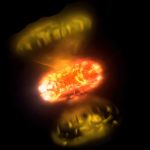Webb finds signs of a thick atmosphere on an ultra-hot super-Earth
Astronomers using NASA’s James Webb Space Telescope have found the strongest evidence yet that a rocky planet outside our solar system can hold on...
This new chip uses sound waves to grab and move tiny objects
Sound is usually something we hear, not something we touch.
But researchers at Virginia Tech have found a way to turn acoustic waves into invisible...
Scientists draw the first detailed map of the Sun’s “point of no return”
Astronomers have created the first continuous, two-dimensional maps of the outer edge of the Sun’s atmosphere, revealing a dynamic and changing boundary where solar...
Most normal matter in the universe isn’t found in planets, stars or galaxies –where...
If you look across space with a telescope, you’ll see countless galaxies, most of which host large central black holes, billions of stars and...
Scientists capture the first high-detail “real-time” images of stars exploding
Astronomers have captured the most detailed close-up images ever taken of stars exploding, known as novae.
These pictures were taken within days of the eruptions...
Astronomers find hidden star that solves a major cosmic dust mystery
Only 70 light-years from Earth, a star called Kappa Tucanae A hosts one of astronomy’s strangest mysteries.
Around it swirls dust so scorching—more than 1,000...
Scientists detect static discharge on airplanes using giant European telescope
Scientists have accidentally uncovered a surprising behavior in commercial airplanes: they emit radio waves when they release built-up static electricity.
This discovery, made by an...
The universe was warm before it was bright
So first the Big Bang happens. Everything is incredibly hot and dense; there are photons flying everywhere, but they keep colliding with electrons and...
Stars surprisingly survive near the Milky Way’s black hole, study finds
Astronomers have long believed that the region around the Milky Way’s central black hole, Sagittarius A*, is one of the most dangerous places in...
After nearly 100 years, dark matter may finally have been seen
Nearly 100 years ago, astronomer Fritz Zwicky made a strange discovery while studying the movement of galaxies.
He noticed that galaxies were moving far faster...










